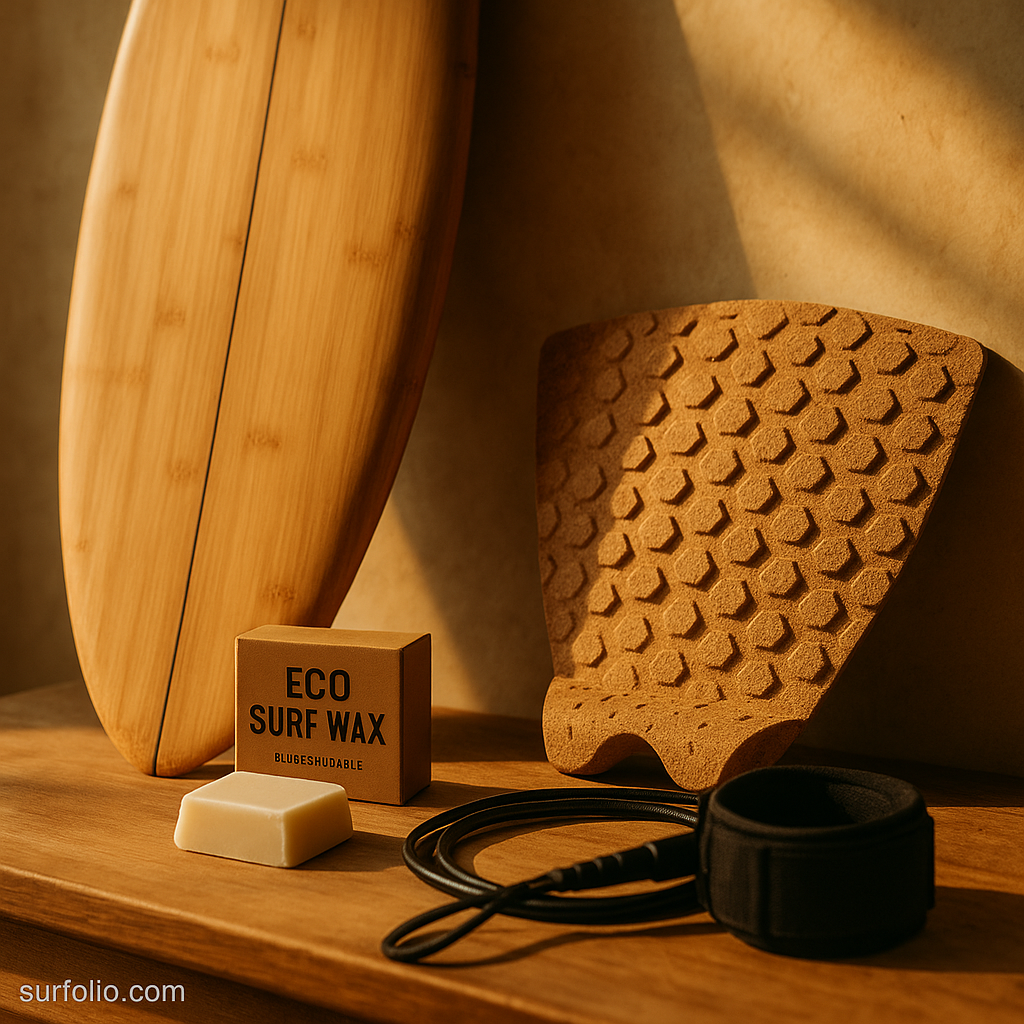
The ocean gives surfers everything — waves, peace, and purpose. But the unfortunate truth is that traditional surf gear isn’t always kind in return. Many surfboards, wetsuits, and waxes are made from petroleum-based materials that harm the very ecosystems we cherish.
Fortunately, a new wave of eco-friendly surf products is transforming the way we approach the sport — prioritizing sustainability without sacrificing performance. From biodegradable wax to recycled wetsuits, these innovations help keep your stoke high and your footprint low.
The Rise of Sustainable Surfing
Sustainability has become a core value in modern surf culture. As awareness grows about plastic pollution, carbon emissions, and waste, surf brands are rethinking materials, manufacturing, and packaging.
Eco-conscious surfers are asking important questions:
- What’s my board made of?
- Where do my products end up?
- How can I protect the ocean I surf in?
Today’s market offers real answers — functional, durable gear built with environmental respect.
1. Eco Surfboards: Riding Greener Waves
Traditional surfboards use polyurethane (PU) foam and polyester resin — materials derived from fossil fuels. Thankfully, the surf industry is shifting toward eco surfboard alternatives.
Top eco innovations:
- Recycled EPS foam: Boards built with reclaimed foam reduce waste and perform like modern shortboards.
- Algae-based blanks: Some brands replace petroleum with renewable algae biomass, cutting carbon output.
- Bio-resins: Epoxy resins made from plant oils emit fewer volatile organic compounds (VOCs) and last longer.
- Bamboo and cork decks: Lightweight, durable, and natural — perfect for eco-conscious surfers.
Eco board brands to watch:
- Firewire Surfboards (Helium & TimberTek) – Uses recycled EPS cores and bio-resins.
- Notox – French-made boards crafted with flax fiber and plant-based resins.
- Spooked Kooks – Recycled soft-tops that perform like traditional foam boards.
Choosing a greener board doesn’t just help the planet — it helps you surf with purpose.
2. Sustainable Wetsuits: Comfort Without Compromise
Wetsuits are essential for warmth, but traditional neoprene is made from chloroprene — a nonrenewable, toxic compound. Enter the new generation of eco wetsuits made from natural and recycled materials.
Best eco materials:
- Yulex® Natural Rubber: Harvested sustainably from rubber trees and certified by the Forest Stewardship Council (FSC).
- Limestone neoprene alternatives: Use calcium carbonate from limestone instead of oil, drastically lowering emissions.
- Recycled linings: Made from post-consumer plastic bottles or scrap nylon for a soft, quick-drying interior.
Brands leading the way:
- Patagonia: Pioneered Yulex wetsuits with durability and fair-trade production.
- Vissla Eco Seas: Uses limestone-based neoprene and recycled fibers.
- Picture Organic: Combines plant-based foams with solvent-free adhesives.
These suits feel just as flexible and warm as traditional ones — proving sustainability doesn’t mean sacrifice.
3. Biodegradable Surf Wax
Many standard waxes contain paraffin, a byproduct of petroleum. When wax flakes wash off in the ocean, they release micro-pollutants. Eco-friendly waxes swap out petrochemicals for natural, biodegradable ingredients.
Planet-safe ingredients:
- Organic beeswax
- Coconut oil
- Tree resins
- Plant-based softeners
Top eco wax brands:
- Matunas Wax: Made from organic ingredients grown on a family farm in California.
- Greenfix: 100% natural and non-toxic, packaged in recycled paper.
- Bubblegum Surf Wax (Eco Line): Combines natural wax with a classic tropical scent.
Bonus: They smell amazing and provide the same reliable grip — without harming the sea you love.
4. Recycled Leashes and Traction Pads
Surf accessories like leashes, pads, and fins are often overlooked, but their materials add up. Thankfully, several brands are reengineering gear using recycled plastics and plant-based foams.
Eco options:
- Recycled TPU leashes: Made from post-consumer plastics and production scraps.
- Cork traction pads: Naturally grippy, comfortable, and biodegradable.
- Algae-based EVA foams: A renewable alternative to petroleum foams.
Recommended brands:
- Creatures of Leisure Eco Line: Recycled materials and eco packaging.
- RSPro Cork Traction: Sustainable cork pads that feel great underfoot.
- Balin Recycled Leashes: Durable cords made from reclaimed ocean plastics.
Small changes in gear choices can make a big difference when multiplied across the global surf community.
5. Reef-Safe Sunscreen
Protecting your skin shouldn’t come at the cost of harming coral reefs. Many sunscreens contain oxybenzone and octinoxate, which are toxic to marine ecosystems.
Choose reef-safe alternatives that use zinc oxide or titanium dioxide as physical barriers instead of chemical filters.
Top reef-safe brands:
- Raw Elements: Certified natural, water-resistant, and packaged in metal tins.
- Sun Bum Mineral Line: Broad-spectrum protection with ocean-safe ingredients.
- All Good: Made with organic botanicals and non-nano zinc.
Apply generously — but make sure your protection is as kind to coral as it is to your skin.
6. Recycled and Organic Surf Apparel
From boardshorts to hoodies, surf apparel has become a sustainability battleground. The new wave of eco clothing brands focuses on organic cotton, recycled polyester, and fair-trade production.
Eco surfwear leaders:
- Outerknown: Founded by Kelly Slater, this brand emphasizes circular fashion and ocean cleanup partnerships.
- Finisterre: UK-based and known for durable, ocean-inspired apparel made from recycled fibers.
- Vissla: Uses upcycled coconut husks and plastic bottles in its boardshorts.
Even your T-shirt can help protect the planet — style meets sustainability in every wave.
7. Ocean-Friendly Travel and Packaging
Even small accessories like wax combs, board bags, and packaging are becoming greener. Look for products using:
- Recycled cardboard or biodegradable packaging.
- Upcycled board bags made from old sails or wetsuits.
- Reusable water bottles and surf wax boxes to reduce single-use waste.
Sustainable surfing is as much about habits as gear — carrying your trash, reusing bottles, and minimizing flights or fuel use can make your surf lifestyle cleaner and more connected.
The Bigger Picture: A Circular Surf Economy
The goal of eco-friendly surfing isn’t perfection — it’s progress. Supporting brands that use recycled, plant-based, or biodegradable materials sends a powerful message: surfers care deeply about the ocean’s future.
By choosing sustainable gear, you’re not just upgrading your setup — you’re helping drive a global shift toward a circular surf economy, where waste becomes raw material, and every purchase protects the planet we ride on.
Final Thoughts
Every surfer owes a debt to the ocean. Choosing eco-friendly surf products is one of the best ways to give back — wave by wave, session by session.
Next time you wax up, pull on your wetsuit, or shop for a new board, look for brands that align with the values of respect, sustainability, and longevity. Because the cleaner we surf, the longer our playground will last.
Ride green, surf free, and keep the ocean wild for generations to come.
